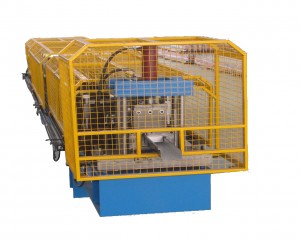Cold forming machines are used in a wide range of industries for the production of parts from metals such as steel, brass, aluminum and other materials. Cold forming is a process that involves shaping metal by applying pressure to it without using heat. This allows manufacturers to produce complex shapes with high accuracy and repeatability while maintaining the strength and integrity of the material. The cold forming process begins by loading a blank part into the machine where it is clamped securely in place. The next step is to apply force via hydraulic or mechanical means which deforms the material into its desired shape. As this occurs, lubricants may be applied to reduce friction between tooling and workpiece during deformations. Afterward, excess material can be trimmed off if necessary before going through any additional finishing operations such as polishing or plating if required. There are many different types of cold forming machines available depending on specific application requirements including those designed for applications involving large volumes at high speeds such as progressive die stamping presses; those designed for producing small batches quickly like transfer press lines; and special purpose machines designed specifically for particular products or processes like multi-slide dies or rotary forging systems. Each type has advantages over others depending on what needs to be accomplished so selecting an appropriate machine requires careful consideration based on factors such as cost effectiveness, speed and accuracy needed etc.. No matter what type of cold forming machine is chosen though there will always be certain benefits that come with their use including reduced costs due to less waste generated compared with traditional hot working methods; improved surface finish quality since no heat affected zones (HAZ) occur during deformations; increased safety levels due to elimination of hazardous fumes typically associated with hot working processes; better product consistency because each part produced should have same characteristics every time regardless how many times they’re made etc… All these reasons make cold forming an attractive option when looking at ways optimize manufacturing operations especially when dealing with difficult materials like titanium alloys which require specialized equipment capable handling extreme temperatures without compromising performance results
Post time: Feb-21-2023

